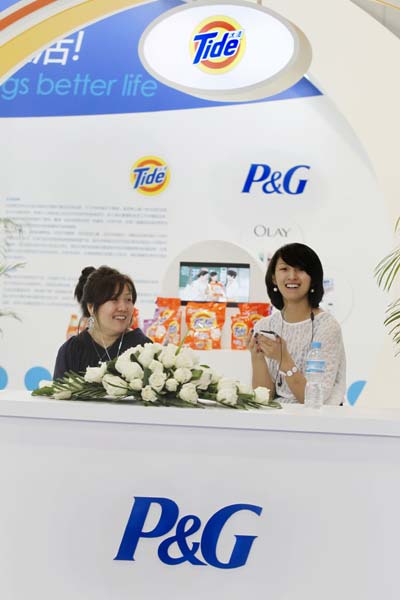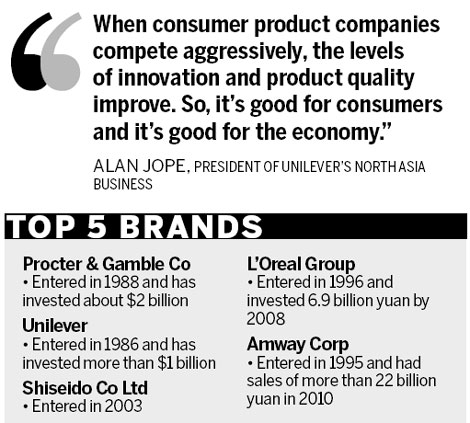International brands still ranked on top
Updated: 2012-10-03 07:17
By Wang Zhuoqiong and Li Woke (China Daily)
|
||||||||
International brands of household and beauty products are increasing investment in China's central and western regions in a bid to better compete with local brands.
On Sept 14, Unilever launched a global manufacturing base in Meishan, Sichuan province.
The facility is the third global-manufacturing base of laundry products and toothpaste after Tianjin and Hefei. The three new plants aim to increase Unilever's exposure in the Chinese market and meet global consumer demand.
The first phase of the manufacturing base in Sichuan, which involved investment of nearly 300 million yuan ($47.5 million), is expected to produce more than 200,000 tons of laundry detergent and will continue to develop other products.
The plant in Tianjin will produce laundry powder, softener, toothpaste and shower gel. The annual production of the factory in Hefei, Anhui province, is worth more than 12 billion yuan.
|
 Procter & Gamble Co, one of the top multinational brands in China, has established a manufacturing plant and a sales center in Chengdu, Sichuan province, and a manufacturing and logistics base in Taicang, Jiangsu province. A Qing / For China Daily |
The nation's consistent economic growth has increased disposable income levels, which in turn has led to higher expenditure on beauty and personal care products, according to a report by Euromonitor International.
Strong multinationals continue to lead the beauty and personal care industry, the report said, adding that the top five players in 2011 were Procter & Gamble Co, L'Oreal Group, Shiseido Co Ltd, Unilever and Amway Corp.
Multinationals are still stronger in marketing and new product development and also offer consumers a wide selection of products, which cover a broad range of categories and prices and cater for various needs and budgets, the report said.
"We welcome competition, whether it's from multinational companies or local companies," said Alan Jope, president of Unilever's North Asia business.
"When consumer product companies compete aggressively, the levels of innovation and product quality improve. So, it's good for consumers and it's good for the economy."
The company's global performance has increased 11.5 percent in the first half of this year.
P&G has also ramped up investment in logistics, research and development and marketing.
In addition to offices, manufacturing plants and a distribution center in Guangdong province, P&G has established a manufacturing plant and a sales center in Chengdu, Sichuan province, and a manufacturing and logistics base in Taicang, Jiangsu province.
P&G entered the mainland market in 1998 and has invested $2 billion in the country. With sales of nearly $5 billion a year, China is the company's second-largest market. The company said it will invest $1 billion in China, which it considers to be an "important growth engine", in the next four years.
L'Oreal announced last year it plans to build Asia's largest cosmetic-manufacturing base in Yichan, Hubei province.
The increasing presence of foreign companies will put pressure on domestic brands and small enterprises, industry analysts said.
As multinational brands maintain a dominant market share in China, domestic companies have also made strong contributions to the beauty and personal care industry, the report by Euromonitor International said.
Jala Co Ltd, Shanghai Jahwa United Co Ltd, Shanghai Inoherb Cosmetics Co Ltd and Carlsan have witnessed double-digit sales growth in 2011, according to the report.
Contact the writers at wangzhuoqiong@chinadaily.com.cn and liwoke@chinadaily.com.cn


 Relief reaches isolated village
Relief reaches isolated village
 Rainfall poses new threats to quake-hit region
Rainfall poses new threats to quake-hit region
 Funerals begin for Boston bombing victims
Funerals begin for Boston bombing victims
 Quake takeaway from China's Air Force
Quake takeaway from China's Air Force
 Obama celebrates young inventors at science fair
Obama celebrates young inventors at science fair
 Earth Day marked around the world
Earth Day marked around the world
 Volunteer team helping students find sense of normalcy
Volunteer team helping students find sense of normalcy
 Ethnic groups quick to join rescue efforts
Ethnic groups quick to join rescue efforts
Most Viewed
Editor's Picks

|

|

|

|

|

|
Today's Top News
Health new priority for quake zone
Xi meets US top military officer
Japan's boats driven out of Diaoyu
China mulls online shopping legislation
Bird flu death toll rises to 22
Putin appoints new ambassador to China
Japanese ships blocked from Diaoyu Islands
Inspired by Guan, more Chinese pick up golf
US Weekly

|

|






